Andrew Collins's Blog, page 21
June 11, 2013
Television Preference Service
 Who’s in here? Well, if you watch this week’s Telly Addict, which avoids spoilers for the final episodes of The Fall on BBC2 and Game Of Thrones on Sky Atlantic (mainly because I hadn’t seen either when I filmed this yesterday), you’ll see clip evidence of at least two supporting actors who are in both shows. Also, new on BBC3, docucircus The Call Centre, and new on C4, the terrific, glacially-paced French “zombie” drama The Returned. And congratulations and clubbable banter all round for the 500th episode of Pointless on BBC1.
Who’s in here? Well, if you watch this week’s Telly Addict, which avoids spoilers for the final episodes of The Fall on BBC2 and Game Of Thrones on Sky Atlantic (mainly because I hadn’t seen either when I filmed this yesterday), you’ll see clip evidence of at least two supporting actors who are in both shows. Also, new on BBC3, docucircus The Call Centre, and new on C4, the terrific, glacially-paced French “zombie” drama The Returned. And congratulations and clubbable banter all round for the 500th episode of Pointless on BBC1.


June 6, 2013
Attention: scum
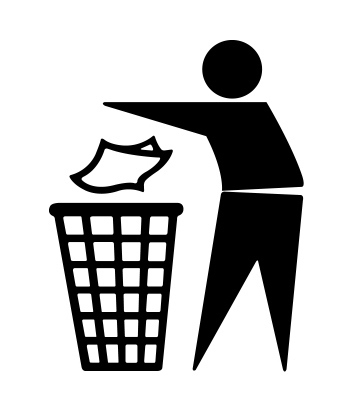
Remember Keep Britain Tidy? It was a ubiquitous campaign when I was growing up, emblemised by this enduring, rudimentary graphic figure dropping litter into a wire bin. Apparently, Keep Britain Tidy became a limited company of the same name in 1984 and expanded to cover various environmental issues in this century, including beaches, anti-social activity and tree-planting. Good for them. It’s hard to argue the case against keeping Britain, or anywhere, tidy. Like charity and barbarism alike, you might say that tidiness begins at home, but it doesn’t. I actually don’t care if your house is tidy or not; it’s the outside of your house that I’m worried about. The part I have to look at as I walk past. The part that’s in public; in Britain.

The term “scum” is overused. It is also misused. Too often it is applied to denote a social class and is thus implicitly snooty, when in fact scumminess knows no economic boundary and comes in many forms.
The photo above, which I took last month but could be taken any day of the week, shows the tip of an iceberg. As I’ve mentioned before, at the British Library, patrons of the reading rooms are required to use supplied, reusable, transparent bags. This is to reduce the import and export of forbidden items into and out of the reading rooms, such as pens, umbrellas, food and drink on the way in, and books belonging to the British Library on the way out. As such, you collect your bag from a neat stack in one of the boxes pictured, and return it to the same place.
These bags can easily be patted back into a flat shape for stacking. I do it every time I go into the library. It takes seconds to do: empty, pat, flatten. However, as you can see from this pictorial evidence, even by mid-afternoon, misshapen, unpatted bags are already being frankly chucked in the general direction of the box, as if perhaps the litterbug imagines his or her mum to be coming round to clear up after them. A polythene volcano effect is the result. British Library cleaning staff – and not patrons’ mums – must then collect them all up and pat them into shape after the library’s inconsiderate, lazy patrons have left, to prepare them for the next day. In the meantime, an ugly eyesore is created. Even a patted-flat bag cannot be neatly stacked once this transparent cancer starts to grow, so the mess snowballs in mocking imitation of chaos theory.
I mention this again, with illustration, because I’m getting increasingly sick of the attitude of people who create mess or litter in places that aren’t their homes. I have re-joined a gym after about four years away, and although the gym itself is well tended, and the staff there vigilant in terms of cleaning, I have noticed some very bad habits on behalf of the club’s members. I can only vouch for men, as I use the men’s changing rooms, but despite the near-spotless surfaces at the beginning of the day, which is when I opt to use the facilities, pre-work, it amazes me how often I go into a shower cubicle and find the wet floor already littered with discarded membership wristbands (which are disposable, but disposable in the bins provided), empty shower gel bottles and – eek! – sticking plasters. It’s clear that some men, like British Library users, think it’s acceptable to drop these things for someone else to sort out.
A gym is a communal space. It requires a certain degree of spatial and social awareness for it to run. You wait for someone else to finish on a piece of resistance equipment; you do not crowd other members on the exercise mats; you put exercise balls and dumbbells back on the rack after use; you wipe your sweat off the machines; and so on. But you have to take this courtesy into the changing rooms with you, and treat the showers and locker areas as if, hey, someone else might be using them after you.

There is a copycat fried-chicken outlet on the parade of shops I walk to each morning to pick up the newspaper, or to take the bus to the station, and rare is the day when I don’t walk past some discarded takeaway packaging from this outlet. It doesn’t take much imagination to picture the scene: drunk bloke, late at night, staggering home, gets the urge to eat something and the only thing to eat is some fried chicken, starts eating it, stops eating it, drops packaging where he sways, staggers home. These places thrive on late-night custom and I seriously do not blame the shop for the litter. Equally, it’s hard to blame drunkards. We’ve all been pissed and bought some takeaway food we barely knew we were buying, let alone eating. It’s an occupational hazard of the leisure society. But this doesn’t stop me seething at the dropped boxes, paper bags, cups, plastic stabbers, napkins and polystyrene coffins. They really are a ghastly symbol of the throwaway culture of capitalism.
Mind you, a simple walk down the street where one lives is rarely a happy occasion, even on a lovely day, as litter creeps in from all angles. I’ve lived in more deprived and depraved areas of London than the one I’m in currently, but there are left plastic bags of dog shit in the gutter, all tied up and ready to be collected by someone else; cigarette butts and those cellophane sheaths from around the box which are often just dropped because they’re see-through and almost not there; and assorted flotsam from the refuse collection, a ritual now so complicated by the compartmentalisation of recycling and composting it takes a number of visits by a number of refuse collectors to scoop it all up, and old flyers and menus and flaps of card tend to be carried off by a gust and left for dead until a resident snaps and picks it up themselves.
And it should not be the responsibility of the refuse collectors to have to gather up all the rubbish that has been nosed by hungry foxes out of bin bags left out by fools the night before. (The main bin collection does not happen until well after breakfast, so there’s no excuse for putting the bags out the night before.) Foxes do not recognise or respect the boundaries of a thin black plastic membrane; they smell food, they get food, assuming it to be food for them, which it is if you handily leave it out at night. I’ve defended foxes before. It’s not their “fault” if your path is decorated with licked-out readymeal trays and tuna lids. Think about it.

I have written before about “broken window theory”, which I first read about in Malcolm Gladwell’s The Tipping Point but originated in a 1982 Atlantic Monthly article by two criminologists: “Consider a building with a few broken windows. If the windows are not repaired, the tendency is for vandals to break a few more windows.” This eventually leads to a rip in the fabric of order – the building’s broken into, squatted, set fire to, and so on. But the line I’m interested in is this one:
Consider a sidewalk. Some litter accumulates. Soon, more litter accumulates. Eventually, people even start leaving bags of trash from take-out restaurants there or even break into cars.
I’ve seen this in action. You must have, too. There’s a minicab firm nearby whose drivers habitually park up in nearby residential streets as there’s no room for them outside the cab office. As long as they don’t leave their engines running or have their radio on loud at night, I don’t begrudge this. But I do begrudge their habit of eating snacky food and dropping the litter out of the driver’s door into the gutter. Which some of them do. This minor starting point of litter is the broken window. It says: litter has been left here; little can be left here; litter should be left here. (I say: take it with you, you scumbags.)
There are troubles in the world more grave and lethal than litter. Governments using pepper spray and chemical weapons on their own citizens springs to mind. Moronic “revenge” attacks on mosques in this country. A disabled man going on hunger strike to protest against being declared fit for work by Atos and losing all of his benefits. But if society breaks down, it has to start somewhere. Every inferno begins with a spark. And that spark might be a dropped gym wristband, or a lobbed British Library bag, or a surreptitiously squirrelled sandwich wrapper at a kerbside.
I used to live near a railway bridge, under which cars and vans would pull up by the cover of darkness and empty out all sorts of rubbish. This is fly tipping, by definition: “the deposit of any waste onto land … with no licence to accept waste.” This includes any path or pavement. It also includes the area outside a charity shop which has had the temerity to have regular opening hours and to close on Sundays, so that you were left with no option but to dump your unwanted clothes and a jigsaw outside their door. The often voluntary, always nice people who work in charity shops don’t deserve to have to pick up discarded junk, often soaked with rain, on a Monday morning. They are not your mum either.
Tidy Britain, tidy mind, tidy democracy.


June 4, 2013
An arresting development
 It’s the dawning of a ne-e-e-ew era for television, and for Telly Addict. Just over two years in the chair, and I’m reviewing my first ever television programme that I didn’t watch on my television. I’m talking about season four of Arrested Development, which can only be viewed by subscribing to video streaming service Netflix, which I have now done. I can’t make the sound work when I connect my MacBook to the TV, though, which is why I’ve only watched the first two of 15 brand new episodes on a laptop screen. Meanwhile, back on steam-driven TV, I’ve been beaten by Chris Packham’s games on Springwatch on BBC2, re-educated by Horrible Histories on CBBC (shouldn’t there be some kind of adult-lock that prevents me from watching this channel?), entertained by Psychobitches on Sky Arts (which is the best female-centric comedy that started last week), and gripped by The Americans on ITV1, which is money well spent by the network. There’s also time for a quick clip from Five Years on BBC2, which I failed to review last week because of the stupid Bank Holiday/Memorial Day Weekend.
It’s the dawning of a ne-e-e-ew era for television, and for Telly Addict. Just over two years in the chair, and I’m reviewing my first ever television programme that I didn’t watch on my television. I’m talking about season four of Arrested Development, which can only be viewed by subscribing to video streaming service Netflix, which I have now done. I can’t make the sound work when I connect my MacBook to the TV, though, which is why I’ve only watched the first two of 15 brand new episodes on a laptop screen. Meanwhile, back on steam-driven TV, I’ve been beaten by Chris Packham’s games on Springwatch on BBC2, re-educated by Horrible Histories on CBBC (shouldn’t there be some kind of adult-lock that prevents me from watching this channel?), entertained by Psychobitches on Sky Arts (which is the best female-centric comedy that started last week), and gripped by The Americans on ITV1, which is money well spent by the network. There’s also time for a quick clip from Five Years on BBC2, which I failed to review last week because of the stupid Bank Holiday/Memorial Day Weekend.


May 30, 2013
Writer’s blog: Week 23, Thursday
Secrecy, pilots, filth, Clash songs, film maths and the Stone Roses …

I spoke to my Dad on the telephone yesterday (with Mum in the background), and he said that they’d assumed I was busy as I hadn’t blogged much recently. It’s cool that they understand how this works. It’s a Thursday. I am still busy, attempting to panel-beat this latest pilot sitcom script into a recognisable shape, but I’ve just this moment sent off the latest draft of a remodelled story breakdown, from which to build the second draft of the script.
It’s weird; I read a Guardian blog yesterday by Caitlin Moran in which she talked us through the entire set-up of the pilot of her first, autobiographical sitcom, Raised By Wolves, which is being developed by Big Talk and co-written with her sister. If you follow Richard Herring’s daily Warming Up blog, you’ll be well up to speed on the content and progress of his latest pilot, Ra-Ra Rasputin, too. The British Comedy Guide publish an exhaustive, constantly updated list of all the comedy pilots currently in development with the proviso, “most pilots are never seen”. There are about 80 at present. It makes depressing reading if you’re in the business of developing comedy with a view to it ever “being seen.”
It’s possible that I am alone in never revealing the details of projects I have in development, for fear of jinxing them. Am I simply superstitious? Or realistic? I was at a social gathering on Saturday night and the question, “What are you working on?” came up. I explained in basic terms what my sitcom was about to the person who asked me, with the same proviso, “It may never get made.” This is the business I work in. (When, in 2005, I “helped” Lee Mack develop Not Going Out – his phrase – we actually shot a non-broadcast pilot at Thames, with a studio audience and a fully functioning set, with no guarantee that the show would be commissioned to series. It was, so we re-cast, re-wrote and re-shot that episode.)
Anyway, if I mentioned the title of my sitcom, or the broadcaster, or production company who are funding its development, I guess it would be in the public domain and would go onto the demoralising British Comedy Guide list. On points, I’d rather keep it to myself. Needless to say, it’s a largely solitary process, with occasional bursts of feedback with actual other human beings, and by turns enjoyable and dispiriting. But you fight on. Because I am waiting for my two immediate managers to sign off on the new story, I am reluctant to forge on with the new script. So I’m writing a blog about not writing a sitcom instead.

So, what other stuff have I been doing that’s not shrouded in superstitious secrecy? I saw the new Irvine Welsh film, Filth, last night, although it’s not out until October, so I’m not sure reviewing it would be the done thing. I don’t mind revealing that it features perhaps James McAvoy’s best performance in front of a camera, certainly one that’s vanity-free, as his character, the depraved Edinburgh detective Bruce Robertson, descends into a private hell before our very eyes. Welsh was at the screening, and got up to introduce the film, by saying, “I hate these preambles … so why don’t we all just watch the fucking film?” (The director Jon Baird was also in attendance, and one of the stars, the mighty John Sessions.) I’m interviewing Welsh tomorrow, and looking forward to it.
While we’re on the subject of development, if you’re lucky, your pilot will move from the British Comedy Guide’s pilots list to its new comedy list, where shows “in production” are logged. (There are fewer shows in production than at pilot stage, although by their rules because the pilot of Raised By Wolves is being made, it counts as “in production”, which it sort of isn’t, strictly.) I am more cheered by this list as two shows I’ve script-edited are included: Badults, the six-ep Pappy’s sitcom which is shot and edited and ready to go on BBC3 in July, and the Greg Davies vehicle for C4, Man Down, whose pilot I script-edited and whose title I came up with – fame, autographs later etc.! (I may or may not be editing the series, we shall see, but I’d like to.) What I will say for Badults and BBC3 is that it was commissioned last August, while we were all in Edinburgh, and that’s a pretty rapid turnaround from script meeting to edit suite, so let’s all be grateful for that.

I have become obsessed with Springwatch on BBC2 and, in particular, presenter Chris Packham’s now-traditional song titles game. In previous years he’s slipped in titles by the Smiths, the Manics and the Cure; this year, it turns out, it’s the Clash. I managed to pick up on five on Monday night, but, by contacting him via the miracle of Twitter, was able to establish with the man himself that there were nine! (That said, two of them were 48 Hours and Deny, which do not leap out of a link in the same way that Drug-Stabbing Time does.) I’m enjoying the rest of the content – birds in reedbeds, weasels raiding nests, sandhoppers under seaweed – but it’s the Clash songs that are keeping me on the edge of my seat.
I am keeping a watertight register of all the films I see this year, new and old. We are nearing the end of May and this is what the month looks like with a day to go:
The Look Of Love | Michael Winterbottom | UK
Fast & Furious 6 | Justin Lin | US
The Eye Of The Storm | Fred Schepisi | Australia
I’m So Excited | Pedro Almodóvar | Spain
Blackfish | Gabriela Cowperthwaite | US
Made Of Stone | Shane Meadows | UK
Star Trek Into Darkness | JJ Abrams | US
Rockshow | Paul McCartney | US
The Great Gatsby | Baz Luhrmann | Australia/US
Miracle | Gavin O’Connor | US
The Hangover Part III | Todd Philips | US
Beware Of Mr Baker | Jay Bulger | UK
Filth | Jon Baird | UK
That means 11 new films (some of which have yet to be released), and two old ones: coincidentally, the Wings concert film Rockshow, originally released in 1980 but shown at the Curzon; and Miracle, a 2004 Disney movie about the American ice hockey victory over Russia at the 1980 Winter Olympics in Lake Placid, a politically charged event I learned about on an American National Geographic documentary about the 80s. Not a storming total, 13, compared to the 23 I saw in January and the 20 I saw in March, but should you care, that means I’ve seen 78 films this year so far. But never mind the quantity, feel the breadth! I’m all about variety and it’s usually the smaller, not necessarily English-speaking films that give the most sustenance. (Not a vintage month in this regard, May; in April I went to Russia, Denmark, Israel, Argentina and Ireland.) I wish I’d never seen The Hangover Part III, for instance; the experience subtracted from my total life experience.
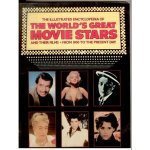
When I was teenager, and first becoming obsessed with films, I started to log them in my diary. At this stage, it was mostly films I’d seen on telly, or on video, and so voracious was my appetite – fuelled by filmographies in assorted film books, like The Illustrated Encyclopedia Of The World’s Great Movie Stars And Their Films, which I got for my 15th birthday, or David Quinlan’s Illustrated Directory of Film Stars, which I got for Christmas in 1981 – a film’s age did not matter. Bring on the films, old and new! Thus it is written that I saw a total of 83 films in 1980, the year my cinephilia almost eclipsed my love of punk rock. My final tally for 1981 would be 121 films. In 1982, when video rental really kicked in, it was 144, and in 1983, I managed a storming 175. As I wrote in Where Did It All Go Right?, I have never stopped being proud of myself for this intense self-education.
As today is the day that Shane Meadows’ Stone Roses documentary Made Of Stone premieres, beamed around selected arthouses by satellite (it goes on general release on June 5), I thought I’d reprint an expanded cut of the review I wrote for Radio Times.

Shane Meadows, a teenage fan when the Stone Roses shook the world with their potent blend of psychedelic rock and swaggering Mancunian groove in the late 80s and early 90s, never saw them live. Thus, this potentially conventional feature-length chronicle of their 2011-12 reunion becomes something more personal. Shadowing the well-preserved four-piece on the road to triumphant shows at Greater Manchester’s Heaton Park – via bonhomie-fuelled rehearsals, a joyous secret gig in Warrington and some bumpy European warm-ups – Meadows gains access-all-areas, his camera often skulking in corridor and dressing room. The band are at the top of their game, musically (and the sound mix does them proud), but Meadows puts the largely middle-aged fans centre stage; their heartwarming stories dominating the Warrington section as grown men leave jobs, families and errands to get in the queue for a golden wristband. Eschewing obligatory talking heads (backstory is told via archive interview, with some genuinely unseen home movie footage), artfully moving between crisp monochrome and glorious colour, and with footnotes-to-camera by the wide-eyed director himself, Made Of Stone replaces hagiography with infectious empathy. A witty, honest and valuable tribute.


May 28, 2013
Velocity rapture

It may seem a little prosaic, but do you mind if I just list some band names? Jasmine Minks. The June Brides. Mighty Mighty. Big Flame. Grab Grab The Haddock. The Wolfhounds. The Dentists. The Servants. The Seers. The Brilliant Corners. The Close Lobsters. Is this painting any kind of picture for you? Cherry Red records, the label who were at the epicentre of the birth of indie, are about to release a five-disc box set entitled Scared To Get Happy: A Story of Indie Pop 1980-1989. It’s out on June 24, and there’s a gig in London on June 22 to mark its arrival.
The compilation boasts 134 tracks by 134 artists, beginning in style with Revolutionary Spirit by the recently reactivated Wild Swans on Zoo in 1982, and ending with Catweazle by future hitmakers the Boo Radleys on Action in 1990; in between, you will be transported back to a simpler time, when t-shirts had horizontal stripes, fringes were worn sticking out of the front of Greek fisherman’s caps and guitars were played in a masturbatory style that somehow perfectly crystallised the raw, undersexed emotion that lay beneath. I have been immersed in this grand testimonial for a week, repressing squeals each time a new memory is unleashed: Delilah Sands by the Brilliant Corners, Toy by the Heart Throbs (the first band I ever interviewed as a cub reporter for the NME at a picnic table outside a pub near Rough Trade’s Kings Cross HQ), Almost Prayed by the Weather Prophets, Every Conversation by the June Brides (a defining anthem of my early student years, which took me and my friend Rob to the Venue in New Cross) …
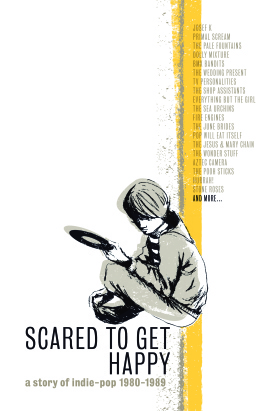
It’s also great to hear early efforts by bands who went on to greater things in the grown-up chart on major labels: Sick Little Girl by Pop Will Eat Itself, Quite Content by the Soup Dragons (whom I interviewed prior to their chart explosion and became good pals with), Motorcity by Age Of Chance (whose baseball hat I proudly wore to my first days at the NME, only to have it frisbeed across the art room by Steven Wells), Vote For Love by Jamie Wednesday, who would become Carter USM. It’s personal for me, this music.
As much as anything, it reminds me of being largely single and occasionally lovesick, which is apt, living on my own, subsisting off boil-in-the-bag Findus meals and large panfuls of mashed potato and cheese, and taping everything but the reggae off Peel and quirkily naming the cassettes (actually, I did record some dub, and certainly remember loving Adrian Sherwood and On-U Sound at the same time, although there is no place for that here).
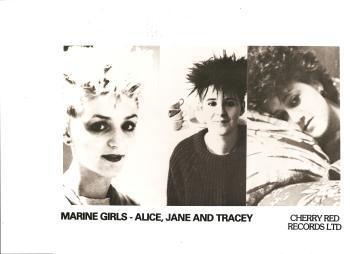
It’s also amazing to hear Grab Grab The Haddock again, the group formed after the Marine Girls by Jane Fox, whom Rob and I adopted as “our” band and followed around a bit. (How bitter the disappointment when they put us on our first ever guest list at the old Marquee, and the doorperson told us that the support band had no guest list.) And the Marine Girls’ Don’t Come Back, all the more poignant for my having sort of befriended Tracey Thorn – certainly remotely – in middle age, as well as Jim Bob, and Miles Hunt (the Wonder Stuff are represented by A Wonderful Day).
There are some “big songs” here, as well as ones that may only mean something to the lucky few: Up The Hill And Down The Slope by The Loft (whom Rob and I saw split up, without knowing it, at Bay 63, supporting The Colour Field, and whose bassist Bill Prince would become my colleague and friend at NME and Q); Velocity Girl by Primal Scream; Just Like Honey by Jesus & Mary Chain; Shine On by the House Of Love. National anthems, all.
I met and interviewed and shared tour bus seats with so many of these indie luminaries as they crossed over to major label hopefuls in the late 80s and early 90s, catching them on the way up, but not necessarily that long before the way down. There are some bands I only remember by name, and not by song – the Corn Dollies, the Waltones, the Raw Herbs – but even the names evoke lazy afternoons and lager in plastic glasses and zip-up jerkins and cheap Top Shop Ray-Ban copies and plastic carrier bags full of fanzines; they speak of Steve Lamacq and Simon Williams and Ian Watson and other be-capped indie enablers.

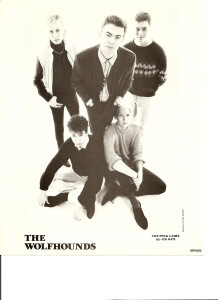
It is a commonplace now that the word “indie” has been stripped of all meaning. But this compilation places it back on an ideological pedestal at a time when it meant beating the system and operating by its own back channel.
As I wrote in 2006 for a piece in Word, the first time I remember seeing the word “indie” was in Sounds, the first of the weekly music papers to carry the indie chart, inaugurated in January 1980 in trade mag Record Business, after an idea by Cherry Red boss Ian McNay. It was based on sales from a network of small record emporia, and was open only to records independently produced, marketed and distributed, that is, outside of the infrastructure of the major labels.
The likes of Virgin, Chrysalis and Island, though established as indies in the 60s and 70s, didn’t count in the 80s as they were distributed by The Man, and this was key to our understanding of the word. The same ideological exile had befallen pre-punk stalwarts Chiswick and Stiff, when they took the majors’ shilling. The indie charts did exactly what they said on the tin, and rapidly became not just an indicator of what was selling, but a useful business tool for the alternative sector, especially in terms of foreign licensing.
Incidentally, I can’t have been the only Sounds reader who initially assumed that the chart bluntly headed “Indies” was dedicated to artists from the West Indies, and not Eyeless In Gaza, the Marine Girls and Crass.
My Select co-conspirator David Cavanagh nailed the scene in his Creation Records doorstop My Magpie Eyes Are Hungry For The Prize (named after a line in the Loft classic), producing a revolving paint dream of indie life in 1980, as Alan Horne, founder of Glasgow’s Postcard, and Edwyn Collins, leader of Orange Juice, put 800 copies of the band’s debut Falling And Laughing into the back of Horne’s dad’s Austin Maxi and head South. They arrive at Rough Trade, still primarily a shop, though also a label. Geoff Travis, hippyish boss of RT, plays the record, digs it and takes 300 on the spot. They manage to get Small Wonder, another capital-based indie shop-turned-label, to take another hundred, and head back to Scotland, “in good cheer.”
It was, in many ways, all downhill from there for the true spirit of indie. But the 134 tunes under Cherry Red’s latest umbrella (and by the way, where would indie be without their pivotal Pillows & Prayers compilation?) are flag-bearers for its finest ideals. Cheap and largely cheerful, albeit wan and apparently permanently single, these songs do it for the kids. If the golden year of 1986 has its own flag – NME’s iconic (yes it is) cassette C86, all of whose contributors are found here, I think – then Scared To Get Happy might have to be casually known as C80-89. It’s that complete.
Let us not remember indie by the snobbish panic that marked the late ’80s when Ecstasy changed the rules. It was certainly too hot to wear leather trousers and tassly suede jackets when you were “on one”. Dance music, while energising the indie scene with heady possibility – and later leading to the comedown-drone of shoegazing – also rent it asunder. Again, as I wrote in Word in a piece brilliantly headlined, by Mark Ellen, Wan Love, in the ensuing cross-pollination, the proliferation of one-off post-Acid House singles in the indie charts offended the purists.
As the Cav notes, one week in July 1992, the highest-placed guitar tune in the indie charts was at number 13. Chart compilers CIN eventually went all Stalinist and excluded these bleeping anomalies, to protect the integrity of Mega City Four, The Family Cat and Midway Still. A similar ideological panic occurred in 1989 when PWL dominated the indie charts with hits by Rick Astley and Kylie Minogue. Until Pete Waterman inked a deal with Warners, he was more indie than the likes of The House Of Love, The Wonder Stuff and The Fall, who had already made themselves ineligible by signing up with majors of their own. They were followed by the next wave, t-shirt bands like Carter USM, Ned’s Atomic Dustbin and Kingmaker.
With indie a marketable property, the majors started setting up their own “boutique” labels – Hut, Dedicated, Indolent, Laurel – all the credibility of indies, none of the tiresome independence. But let’s not go there. Indie: it was alright while it lasted. Now, where’s my fisherman’s cap?


You do have to be Mad to work here
OK, I’ll put my cards on the table and confess that this week’s Telly Addict was written on Thursday and shot on Friday, in order to combat the lack of available production staff on Bank Holiday Monday. As a result, as well as looking at the return of Edinburgh-based detective franchise Case Histories to Sunday-night BBC1 and the season three finale of HBO’s Treme on Sky Atlantic, I called upon a couple of bankers to help tide us over until normal service is resumed next week: Game Of Thrones, and Mad Men, both on Sky Atlantic but both rich for discussion, so it seems. Also, the episode of Mad Men is the maddest ever, and worthy of assessment. There are so many new arrivals already in a holding pattern for next week: Five Years, Horrible Histories, Springwatch …


May 21, 2013
Episodes
Taking my cue from a remark made by Breaking Bad creator Vince Gilligan in the final episode of the excellent PBS documentary The United States Of Television (re-framed and shown here with added Yentob on BBC2), this week’s Telly Addict sets out to prove that the best TV drama is better than Hollywood movies, with specific reference to Game Of Thrones and Mad Men, both at episode seven in their respective seasons on Sky Atlantic at time of writing; also, a tiny leap from Oliver Stone’s Untold History of America, also on Sky Atlantic, to The 80s: The Decade That Made Us on National Geographic (first time on Telly Addict for the channel – ripple of welcoming applause); plus, The Fall, on BBC2, an excellent new police drama from BBC Northern Ireland that punches it weight with the American occupiers; and a strange signal from Hannibal on Sky Living. A packed programme tonight, as the Ronnies used to say. And better than The Great Gatsby, for sure.


May 17, 2013
Bad men

In July 1983, when I was 18, Peter Adamson – the actor known to and loved by millions as Len Fairclough on Coronation St, a character he’d played since 1961 – went on trial for the indecent assault that April of two eight-year-old girls in a swimming pool. As you can see from the blunt-instrument graphic used by the Sun newspaper, the lines between Adamson and his fictional persona were deliberately blurred. I remember the trial well, as I was an avid viewer of the soap at the time. I stuck the above graphic into my diary on Thursday July 21, mid-hearing, alongside this doctored collage from the same newspaper:
 As you may be able to see, I wrote “GUILT” in pencil over Adamson’s suit, so I would be able to add, “He’s got guilt written all over him.” This was my 18-year-old’s idea of a joke. A casualty of trial by tabloid – and the red-tops were pretty despicable then, in their early-80s pomp – I had passed judgement before the court had. (It’s a shame I wasn’t more sensitive, but we cannot rewrite our own history.)
As you may be able to see, I wrote “GUILT” in pencil over Adamson’s suit, so I would be able to add, “He’s got guilt written all over him.” This was my 18-year-old’s idea of a joke. A casualty of trial by tabloid – and the red-tops were pretty despicable then, in their early-80s pomp – I had passed judgement before the court had. (It’s a shame I wasn’t more sensitive, but we cannot rewrite our own history.)
In the event, on July 26, the jury found Adamson – and by dimwitted association, Fairclough – not guilty. But it was immaterial; he’d already been tried and convicted in the public mind. Although he lived until 2002 and managed to get some theatre work, he was never again seen on Coronation St, having been written out back in February, before the arrest, ironically for selling stories to the tabloids. A sad figure by all accounts, he struggled with a long-standing drinking problem and died penniless after a 1991 bankruptcy.
The clinical term “paedophile”, although well established, was not in general use in 1983; it was certainly too long a word for the Sun. I suspect, as well as “dirty bastard”, Len will have been branded a “pervert”. I bring up his story partly because it has stayed with me, and partly because at least two equally well-loved Coronation St stars are currently embroiled in court cases over alleged sexual assault: Michael Le Vell, who’s played Kevin Webster since, coincidentally, 1983, and William Roache, the longest-serving Coronation St star of them all, having been Ken Barlow since the first episode in 1960. Le Vell goes to trial in September for 19 charges, including alleged sexual assault and the rape of a minor; Roache goes to Crown Court next month for the alleged rape of a 15-year-old in 1967. Both men deny all charges.
These big tabloid stories interest us – and, one assumes, appall us – because they are men in the public eye. In the wake of Jimmy Savile, which I wrote about at the time, and Operation Yewtree, the truism is to say that each week discredits another previously loved celebrity from the 60s, 70s and 80s (which covers a lot of our childhoods). If any of these multiple, often historic accusations turn out to be true – and when Stuart Hall pleaded guilty to indecent assaulting 13 girls, aged between 9 and 17 years, between 1967 and 1986, he became the first to cross over from lurid speculation to actual admission of despicable deeds – then it will say dark things about society in the not-too-distant past.


I’m not really here to talk about “the culture” that permitted a now unacceptable degree of “harmless” fun between powerful men and often much younger women, and children, nor about how boundaries have been more clearly drawn in the more enlightened decades since, as to do so often risks sounding as if you excuse the bottom-pinching that was the tip of a much more sinister iceberg. If an ex-Radio 1 DJ is accused, historically, of groping a female work colleague in the 70s, we should not excuse it just because it was time of Carry On films and Benny Hill, any more than rape should be excused because the victim was wearing a skirt. It’s very likely that the victim either didn’t come forward because she feared he or she would not be believed (that’s certainly the case with Savile’s victims), or that he or she did come forward and wasn’t believed.
This past week, Stuart Hazell, who was not a celebrity but achieved a level of ubiquity through his disgusting deeds, was imprisoned for a minimum of 38 years for the murder of his partner’s 12-year-old granddaughter. At the trial, some pretty disturbing insights into this 37-year-old man’s character emerged. With barely time to catch our collective breath about the prevalence of this kind of abuse and murder of children from within families, we saw seven members of a “sex grooming ring” in Oxford convicted at the Old Bailey of abusing six girls, who were targeted, drugged and suffered “sadistic abuse” while aged between 11 and 15. The details are too horrible. I won’t repeat them. Difficult debates are being had about the ethnic background and religion of the men, which largely matches that of the nine convicted last year after a Rochdale sex trafficking ring was exposed. However, there’s a much bigger coincidence, which links Stuart Hall to Stuart Hazell and every other sex offender in between: they’re all men.


Suzanne Moore has been writing passionately and controversially about this subject in the Guardian from a long-range feminist perspective (today’s column was particularly furious). Her concern is not just the seeming ubiquity of male sexual assault, whether historic or current, it’s the failure as she sees it of men to do something about it. She has harsh words for the authorities, social services, the police, the media, for failing to act, but she asks, legitimately, why women seem to be more enraged about it than men. Does that make all men culpable?
This line unfortunately takes us down the hardline Andrea Dworkin route (the uber-feminist wrote, in a 1987 paper called Intercourse, “Physically, the woman in intercourse is a space inhabited, a literal territory occupied literally”), and is not helpful, especially when most men – surely! – are not potential rapists, respect and like women, and know that a child is a child.
I’m quick to say that society is to blame, but that’s not to let individuals off the hook. If you talk about “a crisis of masculinity” it suggests you wish a return to the good old days when men were breadwinners and “masters of the house”, and I have no love for those Victorian values. The pressure on men today is not to be “the man” but to be a more caring, open-minded, feminised member of a family or social group. You might say that men are not born this way; to be the leader is somehow in the DNA of the hunter-gatherer, the physically stronger sex, the Martian (if we really are from Mars). But society changes, for the better, usually, and to fail to adapt is to die.
I re-educated myself in the 80s, taking onboard new information, discarding orthodoxies handed down to me from less enlightened times, and adjusting my behaviour and my thinking accordingly. This was not unique for the time. (I also went to art school, a more effeminate choice than most, and was in a minority as a male at my halls of residence and at college, which can only have had a good effect on me. I also looked effeminate, by choice, and was called a “poof” often in my teens, which galvanised my instincts about sexual equality.) I really do worry about subsequent generations who have grown up with available 24-hour porn, and especially those young enough to have come of age in the post-Loaded era of Nuts and Zoo. Those boys are going to have to do a lot more adjustment than I did.
Anyway, there’s a link between casual, seemingly benign sexism among male friends and unspeakable acts. I am not a psychologist, but the need to wield power must lie at the heart of sexual assault. To abuse, to rape, to threaten, to kill, are all acts of power. Stuart Hazell wanted something that was forbidden under the laws of the land, but he could not stop himself from taking it. Once the switch flicks, men are capable of bad things. We all do and say things we regret, and relationships break down all the time, and we can find ourselves saying unkind things to people we love, but all of this takes place within boundaries. To raise a hand is to cross that boundary; to break the law is to cross another one.
I don’t think you should hit women, but I don’t think you should hit men, or children, either.


Tabloid headlines never tell the whole story. They paint men as “evil”, and quote relatives of victims who wish to see them “hanged”. The headlines above from the April Jones and Tia Sharp cases are designed to lure us in on our basest instincts. The “goodies” and the “baddies” are clear cut in the blunt-instrument tabloid narrative, but the stories also offer voyeurism, and that’s where a lot of the bad stuff starts: looking at things you shouldn’t look at, or looking at things that you should look at, but looking at them in a funny way.
We do not yet know if Rolf Harris, or Michael Le Vell, or Max Clifford, assaulted anyone, although we do know that their careers are likely to be over, even if they are acquitted. We live in suspicious times. (Anyone else see Paul Shane’s name the other night and think, “Oh no, not another one”, before sighing with relief when you found at that, no, he had only died?) The historic cases and the contemporary ones tell a sad story about men. I am, at heart, a self-hating man, in that I have no great love for my gender. I am not perfect, but I do consider myself a feminist and have a pretty sensitive radar to everyday sexism.
I felt very uncomfortable about the fact that, for no real narrative reason, and in a 12A certificate film, Alice Eve stripped down to her underwear in Star Trek Into Darkness. This was a Nuts moment, pandering to the young male’s worst instinct, which is to ogle and objectify. It’s not a trivial matter. Stamp this sort of thing out and you get to the root of the problem: some men hate women and don’t even realise it.


May 14, 2013
Bankers
 On this week’s Telly Addict, we bid farewell, or au revoir, to three dramas that came to an end last week. The Village on BBC1, whose first chapter took us from 1914 to 1920, took a bow via a lovely closing shot of the entire village gathered around the new war memorial; Endeavour on ITV, whose fourth mystery was called Home, scattered lots of delicious clues to future events which we have already seen, on Morse, and left Detective Constable Endeavour himself with the threat of a limp “in middle age”; and Boss, on More4, whose first season operated at such a high pitch of corruption and venality, it was a surprise to see the delicate visual flourish that I have chosen as my clip to illustrate what has been a terrific run. There’s also a peek through our fingers at The Apprentice on BBC1, whose launch episode drew its lowest audience since 2007, and something almost as horrible, NBC’s Hannibal, on Sky Living. I also find time to commend the accessible documentary Bankers on BBC2, which lines up plutocrats in suits and supplies fruit to throw at them.
On this week’s Telly Addict, we bid farewell, or au revoir, to three dramas that came to an end last week. The Village on BBC1, whose first chapter took us from 1914 to 1920, took a bow via a lovely closing shot of the entire village gathered around the new war memorial; Endeavour on ITV, whose fourth mystery was called Home, scattered lots of delicious clues to future events which we have already seen, on Morse, and left Detective Constable Endeavour himself with the threat of a limp “in middle age”; and Boss, on More4, whose first season operated at such a high pitch of corruption and venality, it was a surprise to see the delicate visual flourish that I have chosen as my clip to illustrate what has been a terrific run. There’s also a peek through our fingers at The Apprentice on BBC1, whose launch episode drew its lowest audience since 2007, and something almost as horrible, NBC’s Hannibal, on Sky Living. I also find time to commend the accessible documentary Bankers on BBC2, which lines up plutocrats in suits and supplies fruit to throw at them.


May 7, 2013
Yes, chef
 Catching up with the Masterchef final on BBC1 from last week this week on Telly Addict. Also, the quick death of Four Rooms on C4; Da Vinci’s Demons on Fox; a much more promising new US drama, Banshee, on Sky Atlantic; and two new sitcoms on ITV, Vicious and The Job Lot, one of which I’m sticking with. Due to the Bank Holiday, I hadn’t seen the final episode of The Village when I wrote this one, so I’ll catch up with it next week, as I understand it ended with a song and dance number.
Catching up with the Masterchef final on BBC1 from last week this week on Telly Addict. Also, the quick death of Four Rooms on C4; Da Vinci’s Demons on Fox; a much more promising new US drama, Banshee, on Sky Atlantic; and two new sitcoms on ITV, Vicious and The Job Lot, one of which I’m sticking with. Due to the Bank Holiday, I hadn’t seen the final episode of The Village when I wrote this one, so I’ll catch up with it next week, as I understand it ended with a song and dance number.


Andrew Collins's Blog
- Andrew Collins's profile
- 8 followers





